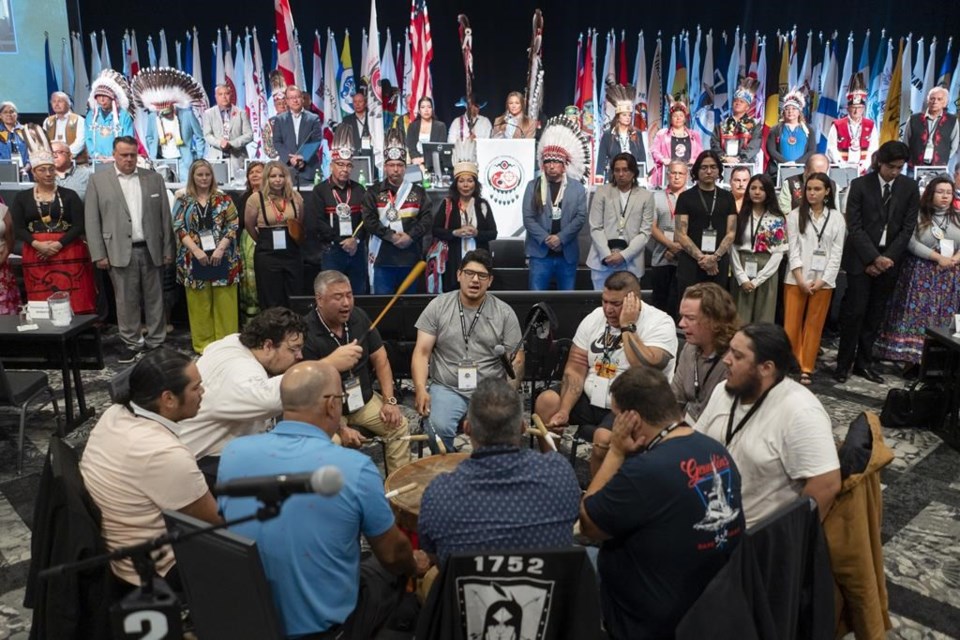WINNIPEG — The six candidates vying to be the next national chief of the organization that represents more than 600 First Nations in Canada explained how they would advocate for treaty rights, sovereignty and health issues during a forum a week before the election.
Four of the major groups representing First Nations in Manitoba hosted the event in Winnipeg on Wednesday to hear from those running to lead the Assembly of First Nations. Chiefs or proxies attended and were given the opportunity to ask questions.
The election follows the dramatic ouster of former national chief RoseAnne Archibald, who was voted out after colleagues accused her of creating a toxic work environment — an allegation she has denied.
The candidates running to replace her are Reginald Bellerose, Craig Makinaw, Sheila North, David Pratt, Dean Sayers and Cindy Woodhouse.
Grand Chief Jerry Daniels, with the Southern Chiefs' Organization, said leaders are looking forward to a change at the national level.
"We want to see a focus on the issues … (The chiefs) want to see support towards what the priorities are in every one of our communities," he told the candidates.
"The more you're able to keep that focus and put the pressure on governments, both federal and provincial, because we need help, too, within the regions, we're going to see the changes."
Woodhouse, who is the assembly's regional chief for Manitoba, said it is the job of the assembly and the national chief to amplify the voices of First Nations and keep community issues front and centre.
"I'd like to … work with all of you to make sure that we have a stronger voice federally," she said.
Woodhouse was the recent Assembly of First Nations lead negotiator for a landmark $23-billion child-welfare settlement that was approved in Federal Court in October.
North is the former grand chief of Manitoba Keewatinowi Okimakanak, an advocate for missing and murdered Indigenous women and girls, and a former journalist. She is running on a platform that includes protecting and enhancing the identities of First Nations people and protecting the inherent treaty rights of First Nations.
"I'm here because I am answering the call from our nations across the country who are seeking unity, who are seeking clarity from their organization," said North.
"You shouldn't feel like you have to work for the Assembly of First Nations. The (assembly) should work for you."
North also recognized the backlash the organization has faced in recent years from community members who have expressed concerns about whom the assembly is representing.
"We need to make (the assembly) relevant again, not just for us, but for our people," she said.
Nisichawayasihk Cree Nation Chief Angela Levasseur questioned the candidates on how they would make sure LGBTQ and two-spirit people are properly represented at meetings and within the organization.
Pratt, who is the vice-chief for the Federation of Sovereign Indigenous Nations in Saskatchewan, said if elected, he would make it a priority to regularly meet with the assembly's LGBTQ and two-spirit council, as well as the women's and youth council, which are both connected directly to the grassroots.
"Give them a greater voice in terms of the direction and priorities of the national chief's office," he said.
Sayers, a former longtime Batchewana First Nation chief, said the national chief should make sure community members are accepted and reflected in systems and policies.
"We have to embrace and celebrate everybody that comes to our community."
Bellerose, chair of the Saskatchewan Indian Gaming Authority and the Saskatchewan Indian Training Assessment Group, is running again after losing out in the assembly's last national chief election.
He told leaders one of his priorities is to ensure northern and remote First Nations receive adequate funding that reflects their unique needs.
"When it comes to housing, mental health, training and access to primary health care, that's all different from the southern perspective."
The candidates were also questioned on how they would address concerns around First Nation membership requirements under the federal government's Indian Act, which outlines who can and cannot be registered.
Makinaw said communities need to be proactive about protecting membership rights.
"We hear from some of our elders that once the last status Indian (has) passed away, (so do) our treaty rights," said the former chief of Ermineskin Cree Nation in central Alberta.
The election is set to occur on Dec. 6 during a special chiefs assembly in Ottawa.
This report by The Canadian Press was first published Nov. 29, 2023.
Brittany Hobson, The Canadian Press

